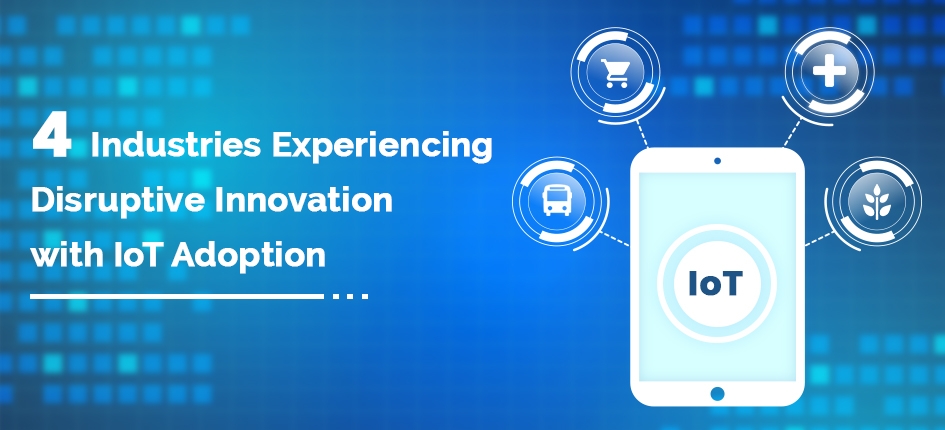4 Industries Experiencing Disruptive Innovation With IoT Adoption

The Internet of Things (IoT) is an innovative technology that has touched human existence in every possible manner. It fuses sensors and devices to facilitate and accelerate the data exchange between them. With such frictionless connectivity, these “things” creates a network that is capable of smart and intelligent interaction.
The most significant impact of this innovation has been seen in the form of home automation. Besides bettering the way we live, it has also penetrated and disrupted the diverse industry verticals in a way people have barely thought of, thus offering abundant opportunities to businesses to make headway.
Let’s have a look at major industries that have experienced the IoT revolution.
Healthcare
Healthcare is a sector that has already realized and exploited the potential of IoT. Earlier, physicians used to spend much time to access and input patient data into the computer systems. However, cloud-based IoT solutions have streamlined this process radically and ensure that patient data is easily accessible across the platform and physical barriers. This convenience has lowered the chances of giving subpar treatments because of a lack of patient history.
Moreover, the IoT not only provides cloud-based solutions to the healthcare industry but also notifies the emergency unit in case of unusual occurrences. For instance, if the BP of a patient falls abruptly, a medic will be instantly reported, and swift action can be taken to overcome the situation. Most healthcare centers are already following this approach, while others are on the verge of adopting this “smart” technology.
Retail
Retail is a sector that has been impacted impeccably by the Internet of Things. There was a time when brick-and-mortar stores were reluctant to adopt technological advancements, and customers had no other way to access the products than visiting stores. Also, garnering information about customer behavior and preferences, and managing inventory were long and complicated procedures.
However, the continued upward momentum of e-commerce changed this scenario. Online stores are springing up and ruling the market now. Since most people are time-constrained, they prefer to shop for products online, and IoT is making it more streamlined.
With IoT-integrated platform, it is way too easy to send push notifications to customers, thus ensuring that you get into their mind regardless of where they are. Likewise, the cloud-based solutions, including inventory management software, retail POS software, and automated checkouts, have digitized and facilitated the management of retail businesses.
Transportation
Transport companies use sensors in their shipping vehicles to monitor their temperature. It ensures that the products get delivered at the destination in perfect condition.
IoT has partially disrupted the transport industry. The integration of real-time traffic data with inbuilt GPS in automobiles showcases the potential of IoT in this sector. This functionality notifies people about the right and less congested routes based on real-time traffic updates and thus, ensures public safety.
IoT solutions also allow people to assess their driving skills without having to physically present in the automobile. Besides, it can be used for fuel-efficiency. Sensors can be incorporated into semi-trucks and public buses to gather the data on fuel usage and cut down fuel consumption.
Agriculture
The capability of IoT in agriculture is beyond imagination. It has been anticipated that IoT device installation in the agriculture industry will grow to a whopping 75M Euros by 2020.
IoT solutions provide real-time data about weather conditions and previous trends to farmers to give them an idea of when to plant their crops. John Deere is already leveraging the same approach. The company created an iPad app having nine mapping layers that track everything happening in the field. Thus, farmers can estimate how many seeds to plant per acre, and precisely, at what distance they should be planted.
The more the farmers are connected with various data, the more the possibilities of a successful and optimized yield.
Conclusion
While only four industries have been mentioned above, many other industries have been or will be disrupted by IoT to no small extent. Now is the time when there is barely a sector that hasn’t been impacted by IoT. The kind of revolution industries are experiencing, currently, is just the tip of the iceberg. IoT possesses a lot to bring to the table in the future and industries that are adopting IoT development services and solutions now will rapidly streamline their operations and drive their growth.

